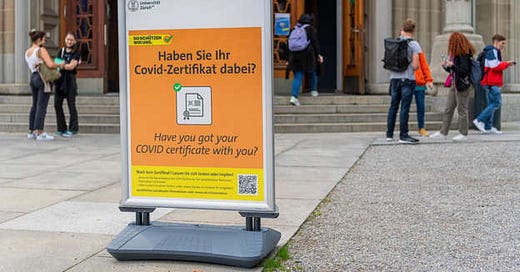Most universities and colleges* in German-speaking Europe are open again these days. After 1.5 years of ‘remote instruction’ for students and ‘home office’ for its academic staff—what about the administrative-technical personnel?—lecture halls and seminar rooms, as well as campuses, are again teeming with life. Yet, to paraphrase Marcellus, something is indeed rotten in the state of academia.
(* This is U.S. verbiage, I know, but it quite accurately reflects public and private higher education institutions ranging from universities to institutions of teacher education to so-called ‘applied universities’, or Fachhochschulen.)
This autumn, institutions of higher education (sic) have introduced national ‘Green Passes’, or ‘Covid Certificates’, which means anyone attending his or her lectures must be either vaccinated (getestet), recovered (genesen), or tested (getestet). In everyday language, this has become known as ‘3G’.
While higher education in the German-speaking areas is highly varied, the main feature—the ‘return’ of staff and students to the hallowed halls of knowledge, but there are a number of important caveats. Those who elect to forego injection with experimental substances (commonly referred to as ‘Covid vaccines’), is excluded. Only those who either submit to participate in the largest medical trial—experiment—of all time are allowed to participate in full.
Over the summer, governments in Austria, Germany, and Switzerland moved to end ‘free’ testing for their citizens-turning-into-subjects, which threatened the wallets of the notoriously precarious student body. Prices for rt-PCR tests (valid 48-72 hours) or antigen rapid tests (valid 24-48 hours) vary widely, but they cost between 10-30 € per test.
This is another sign of the rule of law turning devolving more and more into an instrument to bludgeon citizens into submission. Still, most governments ‘outsourced’ responsibility for these actions to lower levels. Traditionally, higher education falls into the purview of individual states (Länder in Austria and Germany, Kantone in Switzerland), hence the federal governments also decreed that it is on these subsidiary levels that responsibility rests.
In another weird twist, many university leaders went farther than the decrees and executive orders allowed. Take, say, the Swiss case: most universities and colleges introduced Covid passes before the regulations were in place, with the president of the country’s largest university in Zurich brazenly declaring via email on 10 Sept. 2021:
‘A number of questions remain open about the practical implementation of the certificate requirement. As soon as these questions have been clarified, you will be informed of the details.’
Open issues included contract law (enrolment is, legally, a mutually applicable contract), data security, the right to privacy, and, last but not least, who would be performing the Covid certificate checks, as well as the small, if highly relevant issue, of what to do if any student refused to show his or her papers.
Also, note the authoritarian nature: the university president arrogates juridical competence in all of these dealings. Note, further, that blanket paper checks were not permissible before 24 September 2021, as a brief look into currently valid executive orders reveals, to say nothing about the similarly problematic—outright illegal—notion that the president of a public university gets to intervene in a number of other legal categories.
Weirdly enough, the autumn term commenced with the U of Zurich backpedalling in part, offering ‘free’ Covid testing to ensure every student and employee may attend classes (but with explicit notice that these ‘teaching certificates’ won’t be accepted in canteens or gyms). Apparently, someone over at the university’s legal department bothered to read the regulations and inform the leadership, at least to certain degrees.
Finally, the universities have given power to individual instructors to actually check student papers before entering lecture halls, enabling the ‘authoritarian persona’ of faculty and teaching staff to come to the fore. This is not a joke, as numerous examples of wearables such as armbands at, e.g., the Universities of Hannover, Germany, or Linz, Austria, show. Despite history showing this to be a slippery slope, esp. in German-speaking lands, one may now identify compliance by outward appearance.
As a ‘funny’ aside, Swiss universities elected to conduct ‘only’ spot (random) checks, which put them at odds with the country’s powerful restaurant lobby Gastrosuisse. Long opposed by Switzerland’s restaurateurs for obvious reasons, the university’s ‘cavalier’ approach to actually checking the papers made quite some waves, as reported by the Neue Zürcher Zeitung, Switzerland’s equivalent of the NYT.
Compliance being key, only around 150 students and, tellingly, no faculty opposed these measures in a recent protest. With current ‘decision-makers’ and future leaders who overwhelmingly abstain, there is little hope left for the return of the rule of law.




